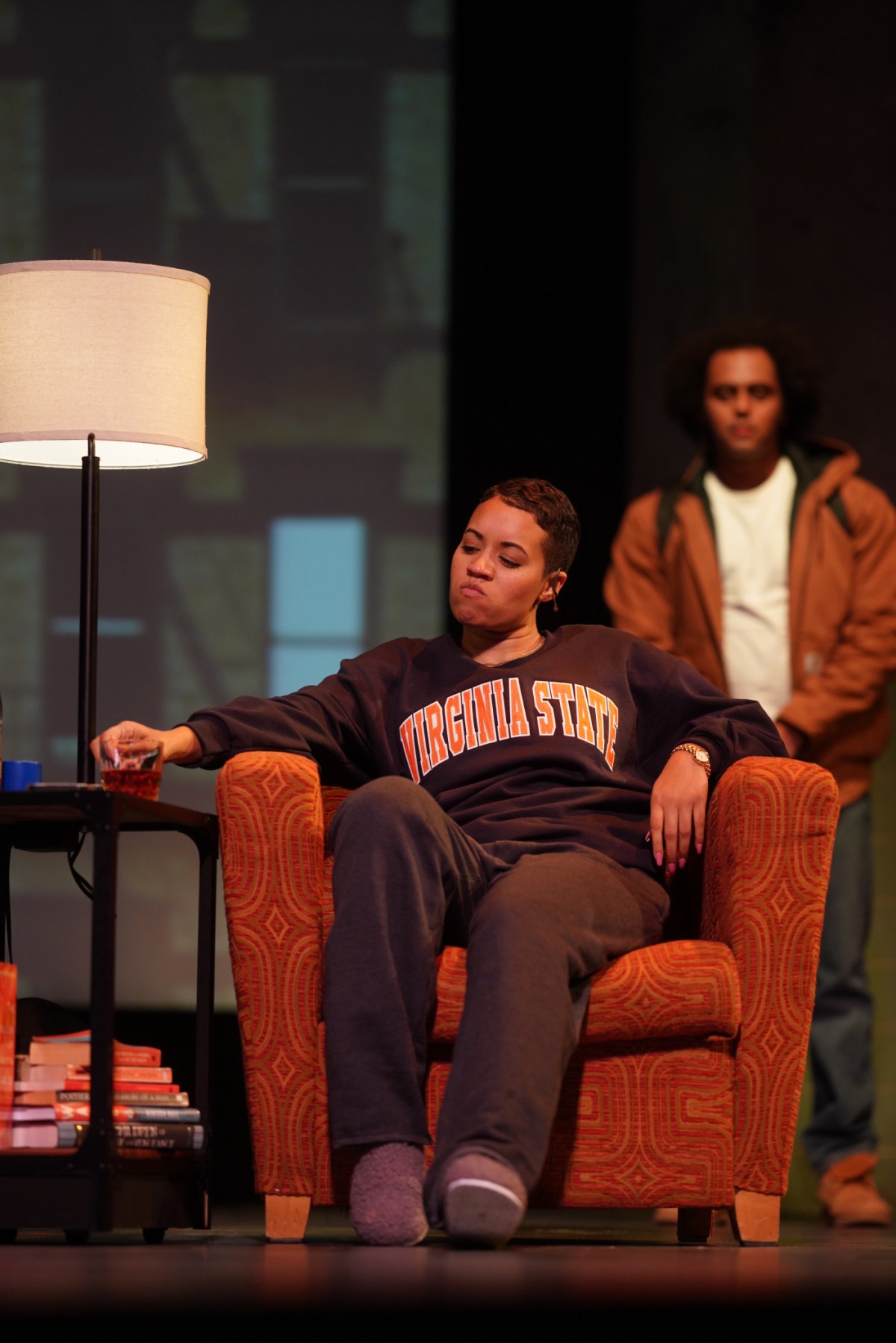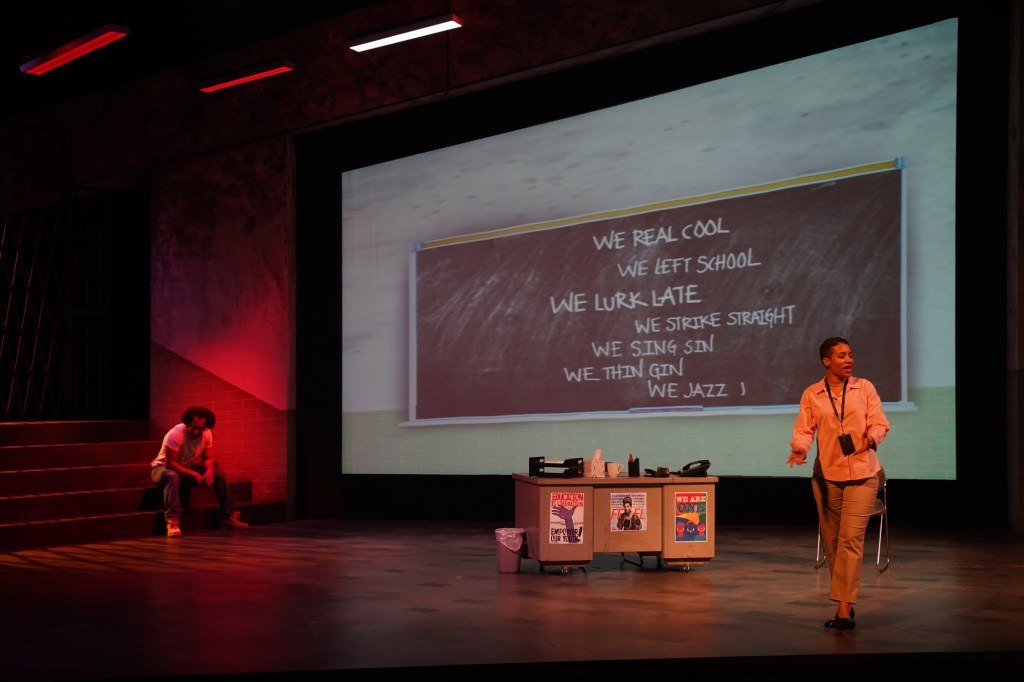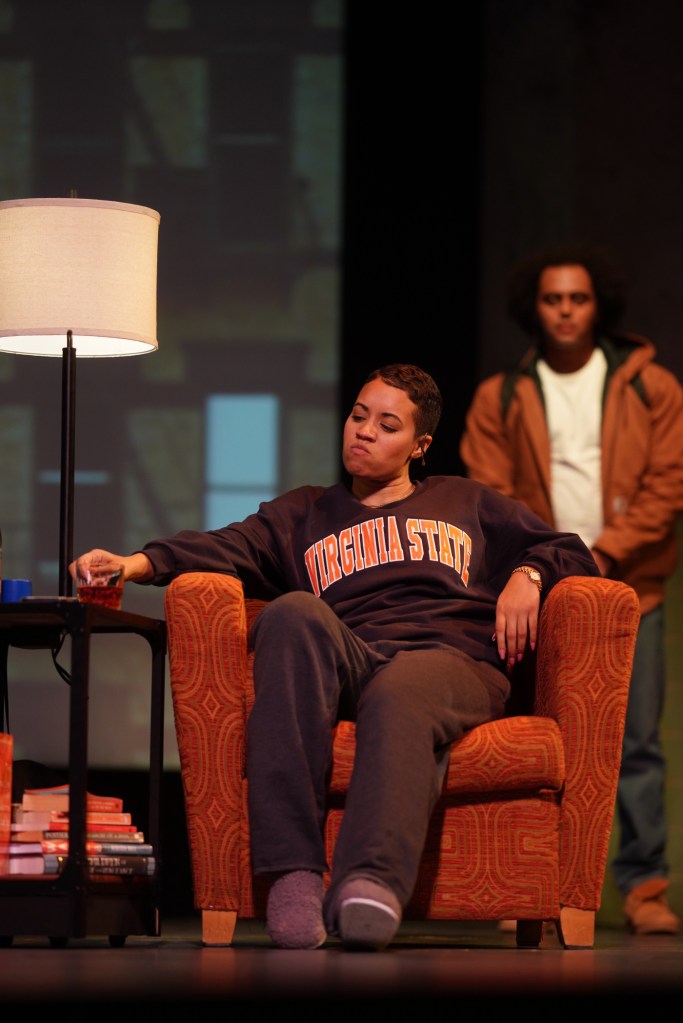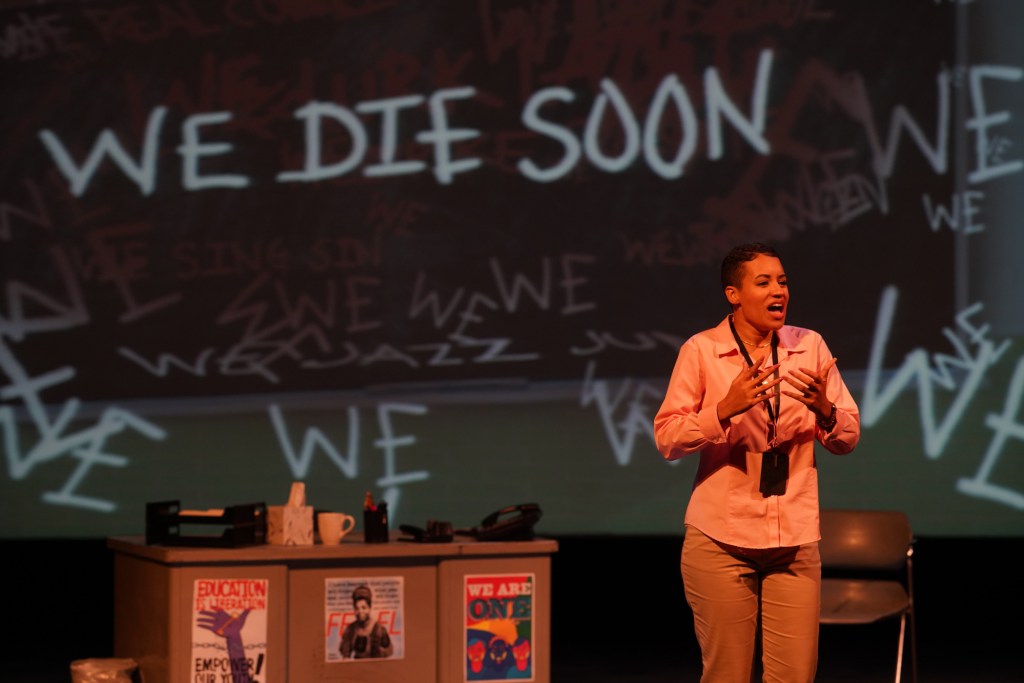The Poetry of Oppression
A Theater Review by Julinda D. Lewis
At: The November Theatre Arenstein Stage. 114 West Broad Street, RVA 23220
Performances: October 15 – November 7, 2021
Ticket Prices: $36-$56. Discounted group rates and rush tickets available.
Info: (804) 282-2620 or www.virginiarep.org
From the striking set, designed by Brian Barker, to the physical interpretation of Gwendolyn Brooks’ poetry by actor Trevor Lawson, to the stunning and sometimes prophetically pixilated projections by Dasia Gregg, the VaRep production of Dominique Morisseau’s PIPELINE grabs your attention and doesn’t give it back for the full 90 minutes that the play runs.
The playwright, Morisseau, the director, VaRep’s Katrinah Carol Lewis, and the indomitable cast, headed by Sasha Wakefield and Trevor Lawson, pack so much content and context into these 90 minutes it may be days, if not weeks, before the full effect is fully unpacked. The title, PIPELINE, refers to the “school to prison pipeline,” that convergence of zero-tolerance school disciplinary policies and law enforcement policies that work together to shuttle black boys into the criminal justice system. Harsh penalties, high rates of suspension and expulsion, and legal actions resulting in higher rates of incarceration for students of color – especially boys – have led to a rising American epidemic over the past two decades. Heavy stuff for a play that, somehow, manages to make us laugh at regular intervals.
Central to the story is Omari, a bright young man learning how to navigate life while containing the anger of generations of systemic racism compounded by immediate family dysfunction. His mother, Nya, a teacher in a public high school, is raising him with little direct help from her ex-husband, Xavier, a businessman. The only thing Omari’s parents seem to agree on is that he should attend an expensive private boarding school from which he is about to be expelled – and possibly worse – after an altercation with a teacher became physical.
That’s the short synopsis. There’s much more. Morisseau, Lewis, and this powerful cast gradually peel back and reveal the many and complex layers of each character and their relationships with one another. It’s not just the complex, loving, and very raw relationship between Omari and his mother Nya, although that is the primary relationship. There is also the explosive relationship between Omari and his father, Xavier – one that remains tantalizingly unresolved at the play’s end. In one scene, Nya has a confrontation with her son’s girlfriend, Jasmine, which resembles nothing less than a smoldering and potentially deadly tango. Then there are Nya’s relationships with her co-workers, Laurie, a fellow teacher (Laine Satterfield) and Dun, her school’s security guard (Todd Patterson). Lest I forget, kudos to Patterson and director Lewis for developing such a nuanced character for Patterson. Dun is an interesting guy, one of the “good guys,” and Patterson sinks his teeth into this role and doesn’t let go until he turns it into a supporting role worthy of attention. A brief scene with all three men – Shabazz, Lawson, and Patterson – explores a multitude of emotions and connections in just a few words.
Another supporting role of note is Jessie Jordan as the spunky girlfriend who respectfully goes toe-to-toe with the self-assured and rather intimidating Nya. Jessie/Jasmine has brains and beauty (frequently reminding all within earshot that she’s “cute”) and knows how to use both. She is also prone to misspeak common idioms, resulting in lines like, “There’s a lot of fish in the swimming pool.” Laine Satterfield plays Nya’s friend and co-worker as the comic sidekick, the sassy white chick. But lest we forget that scar on her forehead is a reminder of reconstructive surgery as the result of being assaulted by a student’s parents in their tough inner city school. Her heart is in the right place, but that doesn’t keep her from teetering on the brink of burnout.
It’s interesting, and perhaps significant, that Xavier, who is supposed to be a co-parent, doesn’t make a physical appearance until about halfway through the play. Iman Shabazz begins his portrayal of Xavier with dignity and grace, but we soon realize that he can barely control the same feelings of rage he wants his own son to control. Sasha Wakefield plays Omari’s mother with fragile confidence. It isn’t easy for Nya to give up her right to be right; it takes a major scare for her to consider alternatives.
So that leaves Omari. Trevor Lawson is called on to portray Omari through raw, brutal movement, using non-verbal language as much as he uses words. And the words he has been given are not just dialogue. Fueled by the words, works, and legacy of Richard Wright’s Native Son, Ralph Ellison’s Invisible Man, and most prominently Gwendolyn Brooks’ poetry, “We Real Cool,” Omari’s speech and movement reflect the cadence of poetry, the intensity of Wright’s Bigger Thomas character, and the philosophy of Ellison’s Invisible Man.Omari shows love and care for his mother, even though he knows of her flaws. While he hasn’t yet come to a place of maturity where he can make peace with his father, he strives to improve the relationship with his mother, creating a list of instructions for her to follow. “Like a list?” she asks. No, he says, “like scripture.” Omari also takes care to distance himself from Jasmine to keep her from experiencing the fallout of his own troubles. “I know why Bigger Thomas did what he did, and I hate that I know,” Omari says at one point.
Like Omari’s non-verbal monologues, Dasia Gregg’s multi-layered and sometimes chaotic projections fill in what words are inadequate or too clumsy to communicate, and Kelsey Cordrey’s sound design splendidly supports the emotional and ambient context. Brian Barker’s set is made of modules that roll in and out quickly – a classroom, a dorm room, a hospital waiting room, a teacher’s break room – further reinforcing the emotional landscape and offering temperature checks of the cultural environment.
Relevant, real, and raw, PIPELINE is a compelling look at life as some Americans know it that may seem foreign, even alien, to many. PIPELINE, for those who listen, explains why there are marches and protests, and debates on systemic racism, defunding the police, and Critical Race Theory. Perhaps some may be more receptive to this mode of learning about these difficult issues, but they must be talked about, one way or another. PIPELINE does not offer solutions, but it makes these issues real and personal, and that’s a start.
Pipeline
by Dominique Morisseau
Cast
Nya – Sasha Wakefield
Omari – Trevor Lawson
Jasmine – Jessie Jordan
Xavier – Iman Shabazz
Laurie – Laine Satterfield
Dun – Todd Patterson
Voiceover – Desirèe Dabney
Xavier Understudy – William Anderson
Jasmine Understudy – Khadijah Franks
Creative Team
Direction: Katrinah Carol Lewis
Scenic Design: Brian Barker
Costume Design: Nia S. Banks
Lighting Design: Steven Koehler
Projection Design: Dasia Gregg
Sound Design: Kelsey Cordrey
Stage Management: Justin Janke
Julinda D. Lewis is a dancer, teacher, and writer who was born in Brooklyn, NY and now lives in Eastern Henrico County.
———-
Photo Credits: Jay Paul
Make a one-time donation
Make a monthly donation
Make a yearly donation
Choose an amount
Or enter a custom amount
Click here to support RVArt Review.
Large or Small; One-time or Monthly.
Your contribution is appreciated.
Your contribution is appreciated.
Your contribution is appreciated.
DonateDonate monthlyDonate yearly







One thought on “PIPELINE”